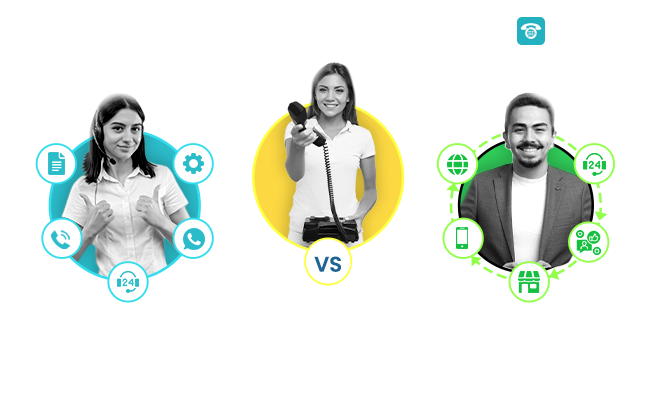Choosing the right communication solutions might come across as daunting, but with ample information and understanding, it’s as simple as spotting bright stars in a night sky.
The understanding begins with one simple question. What is that one thing common in Cloud Contact Technology, Omnichannel Support and VOIP? It’s End-to-End Streamlined Customer Service & Communication
In the realm of modern customer service and communication technologies, Cloud Contact Centers, VOIP (Voice over Internet Protocol), and Omnichannel Communication stand as significant pillars.
Despite their interconnectedness, these solutions serve diverse functions and present unique attributes.
Unraveling the intricacies of each offers a comprehensive understanding and helps in choosing the right communication solutions for your business.
Also, it is imperative to understand how communication solutions contribute uniquely to the evolving landscape of customer engagement and communication strategies.
In this article we explore the functionality and benefits of each of them to underline the differences thus shedding light on major differences between call center and contact center.
Cloud Contact Center
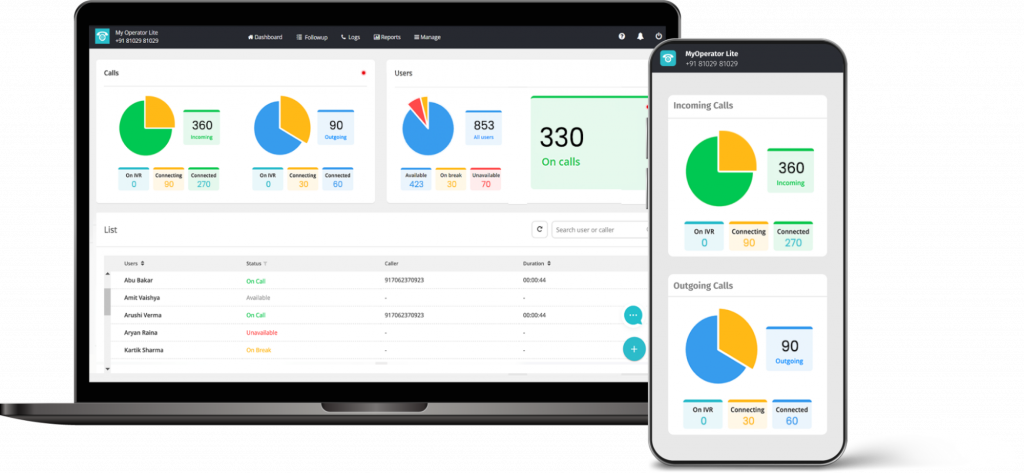
A Cloud Contact Center is a transformative customer service platform that operates seamlessly in the cloud.
Unlike traditional setups, where software and infrastructure are on-premises, cloud contact centers rely on remote servers accessible via the internet. This cloud-based architecture brings numerous advantages, including flexibility, scalability, and reduced infrastructure costs.
Cloud Contact Centers beget enhanced customer engagement and satisfaction. This cloud-based architecture brings numerous advantages, including flexibility, scalability, and reduced infrastructure costs.
The true magic of a cloud contact center lies in its ability to handle a diverse range of communication channels. It isn’t limited to voice calls alone; it’s a multi-faceted hub that manages emails, chat messages, social media interactions, and more.
Central to the purpose of a cloud contact center is its sophisticated mechanism for managing customer inquiries.
Incoming interactions are intelligently routed to the most suitable agents based on predefined rules, ensuring that customers connect with the right expert swiftly. Such a streamlined process minimizes wait times, optimizes agent utilization, and ultimately enhances customer satisfaction.
In addition to routing, cloud contact centers often come equipped with features like Interactive Voice Response (IVR), which offers automated menu options for self-service, and real-time analytics, allowing businesses to monitor and analyze their customer service performance.
In essence, a cloud contact center revolutionizes the way businesses engage with their customers. By leveraging cloud-based technology, these centers transcend the limitations of physical infrastructure, provide a unified communication platform, and deliver unparalleled efficiency and customer-centricity.
As businesses increasingly adopt digital transformations, cloud contact center solutions emerge as a vital tool to stay competitive in the modern customer service landscape.
Key Features of Cloud Contact Centers
Multi-channel support: Allows customers to interact via their preferred communication channels.
Automatic Call Distribution (ACD): Routes incoming calls to the most suitable agents based on skills, availability, or other criteria.
Interactive Voice Response IVR system: Automated menu system that guides callers to the right department or information.
Call Monitoring and Analytics: Supervisors can listen to live calls, monitor agent performance, and analyze call data to improve service quality.
Scalability: Easy to scale up or down based on business needs, making it suitable for organizations of all sizes.
VoIP (Voice over Internet Protocol)
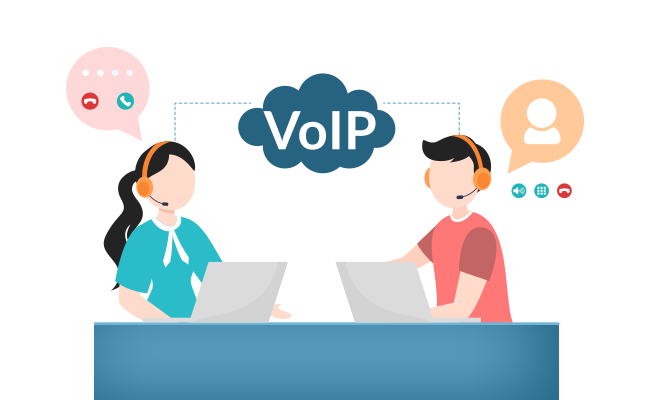
Voice over Internet Protocol (VoIP) is a groundbreaking technology that facilitates voice communication through the internet, bypassing traditional phone lines.
VoIP has redefined voice communication, providing cost-effective solutions and additional functionalities. It’s a game-changer for businesses and individuals, enabling seamless, efficient, and economical communication across the globe.
It converts analog voice signals into digital data packets and transmits them over the internet to the recipient. VOIP technology has revolutionized voice communication by offering cost-effective solutions and added functionalities.
Key Features of VOIP
Cost Savings: VOIP calls are often more cost-effective, especially for long-distance and international calls.
Flexibility: VOIP allows users to make and receive calls from any device connected to the internet, such as smartphones, computers, or dedicated VOIP phones.
Rich Calling Features: VOIP systems typically come with features like call forwarding, voicemail, call waiting, and video conferencing.
Integration: VOIP can be easily integrated with other business communication tools and applications, enhancing overall productivity.
Omnichannel Communication
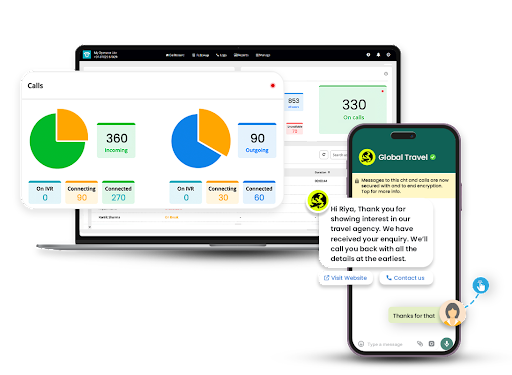
Omnichannel communication refers to a seamless and integrated approach to customer communication across various channels and touchpoints.
It aims to provide a consistent customer experience, allowing customers to transition between channels while maintaining context and continuity.
Omnichannel goes beyond offering multiple communication channels; it focuses on providing a unified and personalized customer journey.
To further enhance customer experience, get toll free number for business to enhance businesses by fostering a professional image
Toll-free numbers help in boosting customer accessibility, and increasing brand credibility. They facilitate cost-free interactions, encouraging customer engagement and inquiries, ultimately driving growth and customer satisfaction.
Key Features of Omnichannel Communication
Channel Consistency: Customers experience consistent interactions and information across all channels.
Contextual Communication: Agents have access to the customer’s interaction history, enabling personalized and context-aware support.
Channel Switching: Customers can seamlessly switch between channels without losing progress or information.
Unified Data and Analytics: Omnichannel systems consolidate data from all channels, providing comprehensive insights into customer behavior and preferences.
Customer-Centric Approach: Omnichannel prioritizes customer needs and preferences, making it easier for customers to engage with a business on their terms.
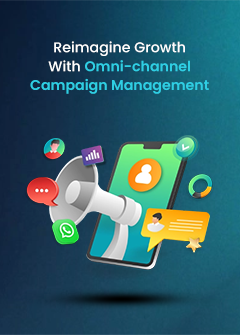
Conclusion
Cloud Contact Centers, VoIP, and Omnichannel communication are all essential components of modern customer service and communication technologies, each serving a unique purpose in enhancing customer experiences and streamlining business operations.
Cloud Contact Centers provide multi-channel support and scalable solutions, VoIP offers cost-effective voice communication, and Omnichannel communication ensures a seamless and personalized customer journey across all touchpoints.
These futuristic solutions enable customer service across multiple channels each with the ability to provide different communication solutions.
In summary, a Cloud Contact Center is a platform designed to manage customer inquiries across various channels, VOIP enables voice communication over the internet, and Omnichannel Communication focuses on providing a unified and seamless customer experience across all channels.
Businesses often utilize a combination of these technologies to deliver exceptional customer service and improve overall communication efficiency.
Ultimately, the best approach for businesses lies in embracing a combination of these technologies to create a powerful and customer-centric ecosystem.
By leveraging the strengths of fusion of Cloud Based technologies, such as MyOperator’s VoIP-based Cloud Contact Center service, organizations can deliver exceptional service, build stronger customer relationships, and stay ahead in the ever-evolving world of customer service.

